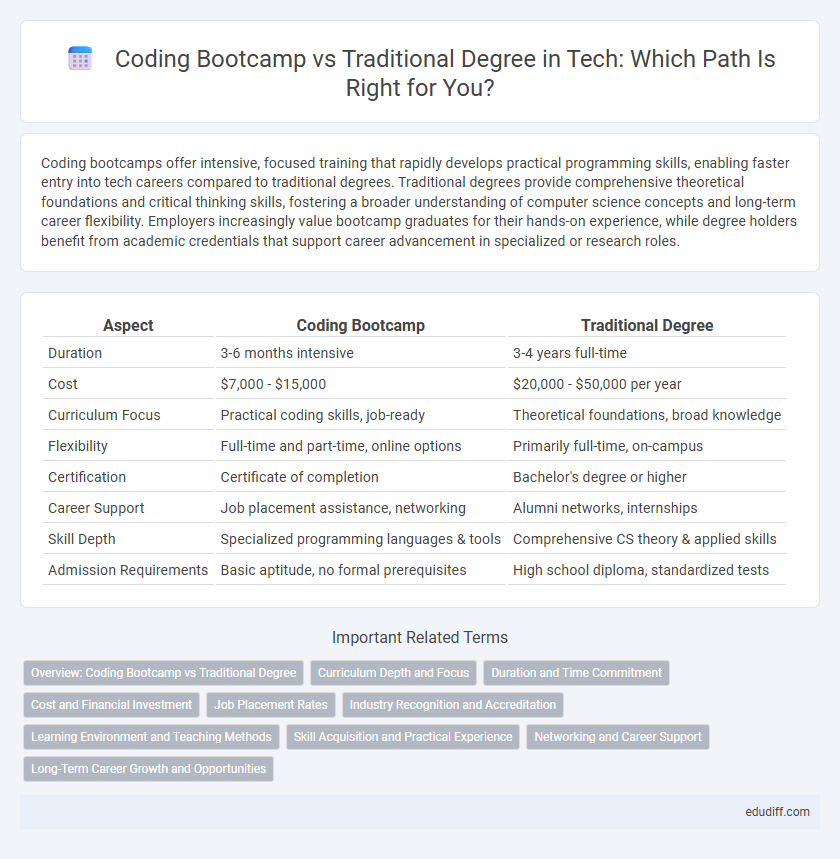Coding bootcamps offer intensive, focused training that rapidly develops practical programming skills, enabling faster entry into tech careers compared to traditional degrees. Traditional degrees provide comprehensive theoretical foundations and critical thinking skills, fostering a broader understanding of computer science concepts and long-term career flexibility. Employers increasingly value bootcamp graduates for their hands-on experience, while degree holders benefit from academic credentials that support career advancement in specialized or research roles.
Table of Comparison
| Aspect | Coding Bootcamp | Traditional Degree |
|---|---|---|
| Duration | 3-6 months intensive | 3-4 years full-time |
| Cost | $7,000 - $15,000 | $20,000 - $50,000 per year |
| Curriculum Focus | Practical coding skills, job-ready | Theoretical foundations, broad knowledge |
| Flexibility | Full-time and part-time, online options | Primarily full-time, on-campus |
| Certification | Certificate of completion | Bachelor's degree or higher |
| Career Support | Job placement assistance, networking | Alumni networks, internships |
| Skill Depth | Specialized programming languages & tools | Comprehensive CS theory & applied skills |
| Admission Requirements | Basic aptitude, no formal prerequisites | High school diploma, standardized tests |
Overview: Coding Bootcamp vs Traditional Degree
Coding Bootcamps provide intensive, short-term training focused on practical coding skills and immediate employability, often lasting 3 to 6 months. Traditional degrees in computer science typically span 3 to 4 years, offering a broader theoretical foundation and deeper understanding of underlying principles in addition to coding. Employers weigh factors like depth of knowledge, time commitment, cost, and specific job requirements when choosing between candidates with bootcamp experience or academic degrees.
Curriculum Depth and Focus
Coding bootcamps deliver intensive, hands-on training with a strong emphasis on practical programming skills and current industry technologies, allowing students to quickly build job-ready portfolios. Traditional degrees in computer science offer a broader and deeper exploration of theoretical concepts, algorithms, data structures, and foundational mathematics, providing a comprehensive understanding of computing principles. The curriculum of a traditional degree is designed to develop analytical thinking and problem-solving skills over several years, whereas bootcamps concentrate on specific coding languages and frameworks for rapid skill acquisition.
Duration and Time Commitment
Coding bootcamps typically require an intensive time commitment of 12 to 24 weeks, offering accelerated learning designed for rapid skill acquisition. Traditional degrees generally span 3 to 4 years, demanding a longer duration with a broader curriculum that includes theoretical and foundational knowledge. The condensed timeline of bootcamps suits those seeking quick entry into the tech workforce, while degrees provide comprehensive education with extensive time investment.
Cost and Financial Investment
Coding bootcamps offer a significantly lower financial investment compared to traditional degrees, with costs typically ranging from $7,000 to $15,000. Traditional computer science degrees often require a four-year commitment and can cost upwards of $40,000 to $100,000, factoring in tuition, fees, and living expenses. The accelerated timeline of bootcamps allows for faster entry into the job market, reducing opportunity cost and overall time to return on investment.
Job Placement Rates
Coding bootcamps often boast job placement rates exceeding 80% within six months of graduation, emphasizing skill-specific training aligned with industry demands. Traditional degrees may have lower immediate job placement rates but provide broader theoretical knowledge and long-term career prospects. Employers increasingly value bootcamp graduates for their practical experience and rapid readiness in technology roles.
Industry Recognition and Accreditation
Coding bootcamps offer intensive, skill-focused training that aligns closely with current industry demands, often resulting in faster workforce entry compared to traditional degrees. Traditional degrees provide broad foundational knowledge and are widely recognized by employers, often carrying formal accreditation from universities and educational bodies. Both pathways have growing acceptance in tech, but degrees typically offer more standardized accreditation, while bootcamps emphasize practical, job-ready skills validated by employer partnerships and industry certifications.
Learning Environment and Teaching Methods
Coding bootcamps emphasize immersive, project-based learning in fast-paced, collaborative environments that mimic real-world tech workplaces, facilitating hands-on experience and immediate application of skills. Traditional degree programs offer structured curricula with comprehensive theoretical foundations, often relying on lectures, exams, and longer timelines to develop deep technical understanding. Bootcamps utilize agile teaching methods with frequent feedback and mentorship, whereas universities focus on formal assessments and academic research to enhance problem-solving abilities.
Skill Acquisition and Practical Experience
Coding bootcamps emphasize accelerated skill acquisition through hands-on projects and real-world applications, enabling learners to quickly develop job-ready programming abilities. Traditional degrees offer comprehensive theoretical foundations and systematic learning over an extended period, providing deeper understanding of computer science principles. Practical experience in bootcamps often surpasses that of traditional programs due to immersive coding challenges and industry collaborations integrated into the curriculum.
Networking and Career Support
Coding bootcamps offer intensive, hands-on networking opportunities with industry professionals and peers through workshops, hackathons, and mentorship programs, fostering immediate career connections. Traditional degrees provide extensive alumni networks, career fairs, and university-sponsored internships that establish long-term industry relationships and structured career support systems. Both pathways enhance career prospects by leveraging unique networking resources tailored to different learning environments and professional development needs.
Long-Term Career Growth and Opportunities
Coding bootcamps offer accelerated skill acquisition in software development, enabling faster entry into the tech industry compared to traditional degrees. However, traditional computer science degrees provide a broader theoretical foundation and are often preferred for advanced roles in research, development, and leadership within large tech companies. Long-term career growth in technology tends to benefit from continuous learning, industry networking, and credential recognition, areas where formal degrees typically have an advantage, while bootcamp graduates may rely more heavily on practical experience and portfolio strength.
Coding Bootcamp vs Traditional Degree Infographic

 edudiff.com
edudiff.com